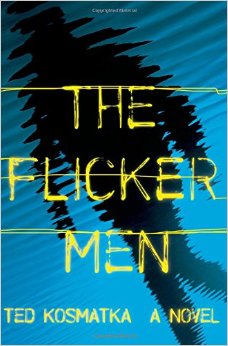 The Flicker Men by Ted Kosmatka is what the best sf should be; a story that compels the reader to grapple with the questions that drive the conflict, writing so good that you’re fixed in place like a pithed frog, and characters that you care about from the opening sentence.
The Flicker Men by Ted Kosmatka is what the best sf should be; a story that compels the reader to grapple with the questions that drive the conflict, writing so good that you’re fixed in place like a pithed frog, and characters that you care about from the opening sentence.
There are no spaceships and square-jawed heroes here, nor is there a single LGBTn (where n is whatever comes next) character– or maybe there are, but they just aren’t wearing a sign. That’s fine in both cases; this book is nonstop terrific. It’s a story about people simultaneously chasing and being chased by their own demons while trying to pull back the veil of mystery underlying the nature of reality and should appeal to all you zombies. It also has real science–or as close to real science as I’ve seen in one of the best novels I’ve read in a long time.
If economics is the dismal science, quantum physics is the absurd one. Spooky action at a distance, cats that are and aren’t alive, and, presented here, something both simpler and more profound; light that is either a wave or a bunch of particles, depending on whether or not anyone’s watching.
I stay away from alternate history partly because I don’t want to be confused about who won what and what happened next. Hard sf rarely does that to me, but The Flicker Men left me more than a bit off balance, wondering just how much of the science is real, how much is made up, and how much it depends on the observer’s point of view.
Eric Argus is a physicist, the thinking kind, not the tinkering kind, though he happens to be the drinking kind too. Someone asks him at one point in the story, “Why are the brilliant ones so fucked up?” In Eric’s case, it was inevitable. Both his parents came from families of alcoholics, like drawn to like, and were both brilliant scientists in their own rights, even if his mother was never quite sane after his father’s suicide. So when the novel opens with Eric standing on a beach with a gun in one hand and a bottle of vodka in the other, wondering which one he’s going to empty first, we know he’s inherited the full package.
Eric has come to the East Coast for a second chance. Back in Indianapolis he was doing groundbreaking work in quantum mechanics, right until he reached the point in an equation that pulled the nature of reality out from under him, sending him reeling drunkenly through the streets and into disgrace.
“The more research I did, the less I believed.”
“In quantum physics?”
“No,” I said. “In the world.”
His old friend Jeremy is an executive at a prestigious scientific think tank, and he finds a way to make room for Eric to come to Boston and pick up where he left off. Only Eric isn’t kidding when he says that he won’t touch his old work. Now he’s got three months to find something new, or to reconsider. They both know this isn’t just a second chance; it’s the second to last chance for Eric.
So Eric wanders around the labs meeting people, slowly making connections, becoming part of their shared world. What he doesn’t realize is that he’s building the team he’s going to need for the project that hasn’t occurred to him yet–an exploration of the limits of the effect of observation on quantum phenomena. In Eric’s damaged mind, and the writer’s capable hands, it’s a spell-binding pursuit of reality, the nature of consciousness, and ultimately, what it means to be human.
If whether or not a phenomenon is observed affects its outcome, what defines an observer? Eric sets out to determine what the universe considers to be a valid observer, creating, along the way, his own version of the Turing test. He’s going to find out more than he bargained for, and face truths more unsettling than you’re imagining right now, and I’m betting you can imagine a lot.
The first half of the book is all science and mystery, which builds up a lot of potential energy for the second half to release in a kinetic stream of consequences that move along at breakneck speed. Eric has unleashed hidden knowledge on the world, but that doesn’t mean that it’s been hidden from everyone. Some look to his discovery to see what it can do for them, but others are willing to go to any lengths to keep the knowledge hidden, because they already know the answers.
The Flicker Men is as finely crafted as it is provocative. I’d recommend it for summer reading by the beach, or winter reading by the fire. Where you are won’t matter once you get lost in its pages.